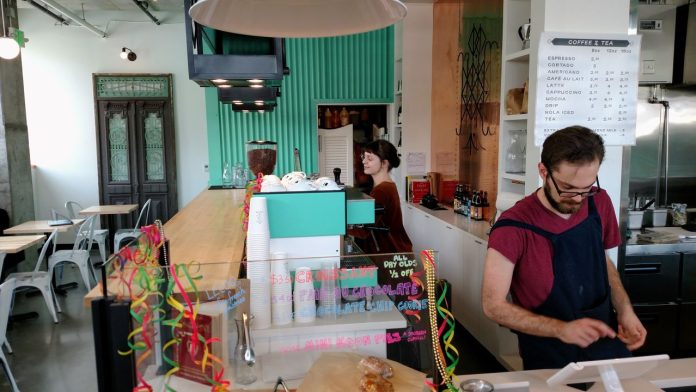
The Seattle City Council doesn’t know what they’re about to unleash.
Seattle’s new crop of conservative-leaning councilmembers closed the book on more than a decade of progressive legislating, but it seems that’s not enough. Some of them now want to undo its signature achievement: The nation’s highest minimum wage.
The $15 minimum wage was a hard-fought campaign that brought together, however uneasily, different parts of the progressive left and shaped Seattle’s identity as a city. 2013 was the year of SeaTac’s successful $15 minimum wage ballot initiative, the first in the nation. It was a year of fast food workers striking for higher pay. It was the year of socialist Kshama Sawant’s first successful council race, and a mayoral contest in which both candidates promised a $15 minimum wage. That December we marched from SeaTac to Seattle, symbolically bringing the movement for higher wages from one city to the other.
The ordinance that ultimately passed the council with a unanimous vote in the spring of 2014 was a carefully negotiated compromise between leaders of business and labor. It included a ten-year phase-in with different schedules depending on an employer’s size and whether its workers receive medical benefits and tips. Labor’s bottom line? That once this phase-in was complete, all Seattle workers would be guaranteed the same base wage, no exceptions.
Ten years of inflation adjustments later, $20 is the new $15, and the agreed-upon phase-in will end this year. For workers at businesses with fewer than 500 employees who receive at least $2.72 an hour in tips or medical benefits, that will mean a significant jump up from their current wage of $17.25 an hour. After a cost-of-living raise from this year’s standard rate of $19.97, these workers should see at least a $3 an hour bump next January.
Or maybe not. Some of our new councilmembers want to break the deal.
Restaurant and other industry groups have been hard at work lobbying the councilmembers they helped to elect, and last Friday Councilmember Joy Hollingsworth proposed legislation to halt the final step of the minimum wage phase-in. Instead of jumping up to match the rest of Seattle’s workforce, tipped workers and others currently making $17.25 would remain stuck on a lower tier that only adjusts for inflation each year into the future.
Needless to say, I think this is a no good, very bad idea. As Burien People Power organizer Nancy Kick and I explained in our op-ed on why we’re taking Burien’s minimum wage to the ballot box, subminimum wages for tipped workers have a long and ugly history going back to the days of slavery. Washington state eliminated the tip penalty in our statewide minimum wage way back in 1988. But you don’t need history to make the case, because it’s common sense: Tips are supposed to be a complimentary bonus for workers, not a subsidy for their bosses.
Plus, the idea that tipped workers and workers who get some medical benefits are doing just fine and don’t need the same baseline wage as other workers is absurd. Have you noticed the cost of living in this city? Already low-wage workers are severely rent burdened or forced into long commutes from cities where housing is somewhat cheaper. A minimum wage should be just that, a minimum. Whatever measure you use for a “living wage” — you can look to MIT’s living wage calculator, the National Low Income Housing Coalition’s Out of Reach data, or the University of Washington’s Self-Sufficiency Standard, among others — $20 an hour ain’t it.
There’s a special irony in this proposal coming from the councilmember who represents District 3, Sawant’s old district and probably the most left-leaning in Seattle. I’m sorry, but I live on Capitol Hill and there’s just no way that a majority of residents (let alone workers) in this district support this backsliding move.
If you want hard evidence that voters don’t like subminimum wages for tipped workers, look no further than Washington, D.C. In 2022, voters overwhelmingly passed Initiative 82, which phases out the tip credit (or tip penalty, from the worker’s perspective) in that city’s minimum wage law. And among state minimum wage laws, Washington isn’t alone in abolishing tip penalties: Alaska, California, Minnesota, Montana, Nevada, and Oregon have all done the same.
If our current city council can be said to have a mandate from the voters, it’s on the issues of homelessness and public safety that were central to their campaigns. Not one of them was elected on promises to roll back workers’ rights. They didn’t get elected to do this, and I don’t think they know what they’re getting themselves into. They’re about to awaken the backlash to the backlash.
Labor mostly sat out the last local election cycle. If there’s a sure way to get the progressive powers-that-be back in the game, spending the big bucks and throwing their weight around, this is it. And the grassroots left will be right there pounding the pavement, too.
Next year, Seattle voters will fill two council seats as well as the offices of the mayor and city attorney. If the council doesn’t back off this stupid plan, we may also get to vote to raise the minimum wage. The 2014 deal was struck under pressure from a citizen’s initiative run by the Sawant-allied 15 Now campaign, which proposed a more aggressive phase-in.
If I were the one writing a new initiative for 2025, I’d go a lot further than reinstating that old compromise. Paid vacation, anyone? And Seattle’s wage should at least match the now-higher standard in Tukwila, Renton, and unincorporated King County, which is $20.29 this year. Seattle’s landmark minimum wage law has to be one of the most popular things the city has ever done. If the council really wants to reopen this particular can of worms, let’s go for broke.
Katie Wilson’s “Policy Lab” series delves into progressive policy innovations from leading U.S. cities. So far, the series has covered transportation mode shift incentives, taking the rich, and paid vacation.
Katie Wilson is General Secretary of the Transit Riders Union, a Seattle-based organization advocating for improving transit quality and making access more equitable. In 2025, she launched a run for Seattle Mayor.

